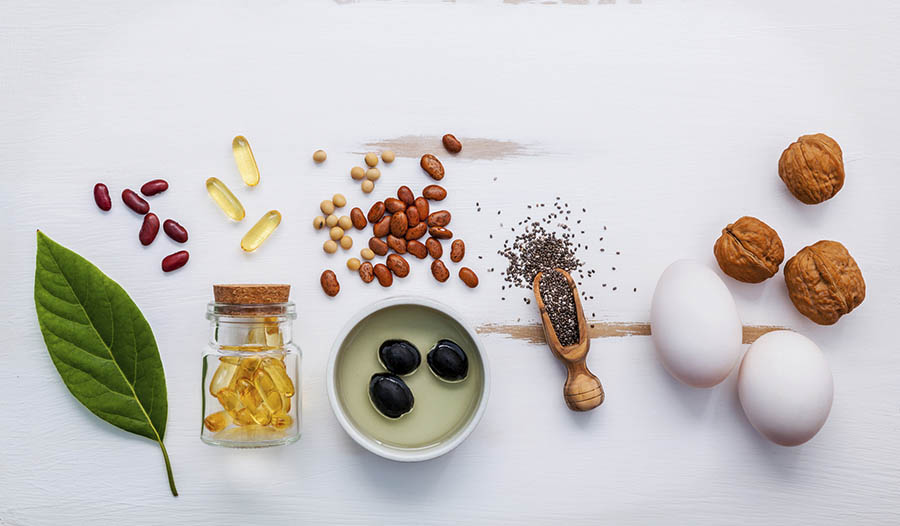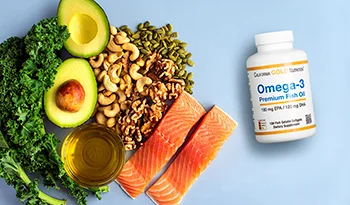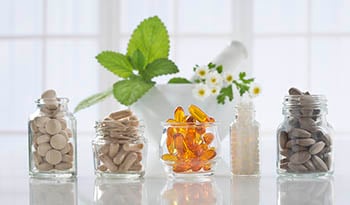Top 6 Supplements Vegetarians May Need
DISCLAIMER:This blog does not intend to provide diagnosis...
- In this article:
- Calcium
- Iron
- Omega-3 Fatty Acids
- Protein
- Vitamin B-12
- Vitamin D

People choose to be vegetarian or vegan for many reasons. Some do it for health while others do it based on religious or political convictions. Abstaining from meat and other animal products may require self-control and perseverance, especially for those who are just beginning to make the switch, but many feel it is worth it and follow the diet for a lifetime.
There is some evidence that vegetarians may live longer than heavy meat eaters. However, the reasons may have little to do with meat itself. Longevity among vegetarians may actually be linked to other healthy lifestyle habits—vegetarians and vegans, in general, are more likely to exercise, avoid excess alcohol and refrain from tobacco use. Vegetarians also tend to weigh less than non-vegetarians, which plays a big role in the development of chronic diseases such as high blood pressure and diabetes.
A vegetarian is a someone who does not eat meat, but there are variations of restrictions within vegetarianism. The Vegetarian Society lists four groups of vegetarians:
- Lacto-ovo vegetarians consume a plant-based diet but also include dairy and eggs.
- Lacto-vegetarians consume a plant-based diet and dairy products. They avoid eggs.
- Ovo-vegetarians consume a plant-based diet and eggs. They avoid dairy.
- Vegans are “strict vegetarians” who consume a plant-based diet and avoid eggs and dairy products. Vegans also usually abstain from using and wearing animal-based products, such as leather.
Vegetarianism has become increasingly common within the last few years. If you choose to cut out meat or animal products from your diet, it is very important to take measures to maintain a well-balanced diet and fuel your body with nutrients you might be missing.
Nutrients That the Body Needs
According to Dr. Mark Hyman, vegetarians are frequently deficient in some very important nutrients. Even though vegetarians and vegans alike may consume mostly plants, which is essential for health, it is also important to be sure you are consuming the following nutrients.
Calcium
The most plentiful mineral in the body is calcium, a much-needed nutrient. It helps with vascular function, muscle function, nerve transmission, and is required for bone strength. The National Institute of Health reported that “vegetarians might absorb less calcium than omnivores (those without dietary restrictions) because of the high plant product consumption…however, some vegans may not obtain sufficient calcium because of their avoidance of dairy foods.” In the same article, it states that in the “Oxford cohort of the European Prospective Investigation into Cancer and Nutrition”, bone fracture risk was similar in meat eaters, fish eaters and vegetarians, but higher in vegans, likely due to their lower mean calcium intake.” Also, it is interesting to note that 100 grams of kale has 100 mg of calcium while 100 ml of milk (1/2 cup) has about 125 mg of calcium.
Calcium can be found in milk, yogurt, and cheese, but it's also available in non-dairy food sources such as:
- Kale
- Broccoli
- Watercress
- Butternut Squash
- Spinach
- Bok Choy
- Turnip greens
- Tofu
- Cabbage
- Coconut water
It is extremely important for vegetarians to consider a calcium supplement if they are not consuming enough calcium in their foods. Suggested dose 500 to 1,000 mg per day.
Iron
Low amounts of iron in a person’s diet can result in anemia as well as other health risks. Anemia due to iron deficiency is common. It can occur in women who have heavy menses, or may occur in individuals with hemorrhoids, colon polyps or colon cancer. Once the cause is identified, a physician may recommend iron supplementation. When taking iron, vitamin C should also be taken as this will help improve absorption of the iron and help reduce the constipation side effect of iron.
Healthy amounts of iron promote increased brain function, help with body temperature regulation, and can prevent chronic diseases. Iron can be found in the following foods:
- White beans
- Dark chocolate
- Spinach
- Potatoes
- Cashews
- Tomatoes
- Chickpeas
- Tofu
An iron supplement may be necessary for some to help get a sufficient amount of iron. An article from the Journal of Research in Medical Sciences stated that, “iron deficiency can exist with or without anemia...Even mild and moderate forms of iron deficiency anemia can be associated with functional impairments affecting cognitive development, immunity mechanisms, and work capacity.”
Vegetarians should be very mindful of the amounts of iron they are consuming in their diets. If unsure, ask your doctor to order a blood test that includes a complete blood count (CBC), ferritin and iron level. Those with hemochromatosis, a condition where excess iron is stored in the body, should avoid iron supplementation unless instructed to do so by a healthcare professional. Suggested dose: As suggested on the label. Available in tablets and in gummy formulas.
Omega-3 Fatty Acids
Omega-3 fatty acids are known for being in fish oil, but there are non-animal sources of this essential fatty acid. Omega-3 fatty acids consist primarily of eicosapentaenoic acid (EPA) and docosahexaenoic acid (DHA). These fatty acids are needed to help with muscle, brain and vascular health. A 2014 study in Nutrition Journal showed that the majority of Americans and others around the world do not consume enough essential fatty acids in their diet. These important nutrients can be found in a variety of vegetarian food sources such as walnuts, chia seeds, flax seeds, hemp seeds, avocado, and natto.
A 2017 study in Future Science showed omega-3 fatty acids can reduce the inflammation leading to heart disease. Another study from the same year in Atherosclerosis showed that higher levels of omega-3 in the blood could reduce death from heart disease by 30 percent.
Omega fatty acids are also important for cell growth. A deficiency of omega-3 is greater in vegans than in non-vegan vegetarians. The National Institute of Health states, “a deficiency of omega-3s can cause rough, scaly skin and a red, swollen, itchy rash.” If you are on blood thinners, it is important to consult with your doctor before beginning omega-3 supplementation. Suggested dose: 1,000 to 2,000 mg daily.
For those wanting vegan alternatives, consider flax seed, hemp oil and coconut oil.
Protein
Protein is a vital nutrient that is responsible for many body functions, including building tissues, muscle, and cells. When a person tells others they are vegetarian, they are frequently asked, “How do you get your protein?" While meat is the easiest way to add a good amount of amino acids and protein to one’s diet, there are many alternatives to ensure an adequate amount of protein exists in vegetarian diets.
Excellent sources of high-protein foods include the following:
- Quinoa
- Buckwheat
- Soy
- Green Peas
- Legumes
- Beans (pinto, black, kidney, etc.)
- Nuts
- Tempeh and tofu
- Edamame
- Hemp seeds
- Chia seeds
- Peanut butter and almond butter
For example, six ounces (170 grams) of meat has 44 grams of protein while 1 cup (236 ml) of pinto beans has 41 grams of protein. Obviously, consuming a plant-based diet can provide adequate protein for most. There is also a fiber benefit from plant-based foods.
However, according to an article by New York Times Bestseller, Dr. Mehmet Oz, too little protein can result in fatigue, weakness and muscle loss in addition to slowing down metabolism. "It also weakens your immune system. That’s why everyone should have at least 25 grams of protein at every meal or around 75 grams of protein per day,” he says.
Protein powders are a good option for those wanting to ensure adequate intake. Whey protein powder is a suitable option for those who consume dairy. There are also vegan protein powders, usually made from rice protein and/or pea protein, available for those who want to avoid dairy.
Vitamin B-12
Vitamin B-12 is often overlooked in a person’s diet, but having a deficiency of this important nutrient can be detrimental to one's health. According to the National Institutes of Health, “Vitamin B12 is a nutrient that helps keep the body’s nerve and blood cells healthy and helps make DNA, the genetic material in all cells. Vitamin B12 also helps prevent a type of anemia called megaloblastic anemia that makes one feel tired and weak.” Vitamin B12 is found in eggs, milk, cheese, meat, fish, shellfish and poultry. Many of these foods are not in vegetarian and vegan diets, but there are alternatives for getting vitamin B12 besides taking vitamins/supplements. Yogurt, fortified plant-based milk, and fortified cereals are all great sources. Vegans can usually find vitamin B-12 through fortified non-dairy milk, meat substitutes, and nutritional yeast.
Suggestion: A vitamin B12 supplement at a daily dose of 500 mcg to 2,000 mcg per day is taken by many vegetarians.
Vitamin D
Vitamin D is a very well-known and goes by the nickname “the sunshine vitamin”. It plays many roles in the body, including promoting bone and teeth health, supporting the immune and nervous system, and helping regulate insulin (which is beneficial in diabetic management). Heart and lung health can also be aided by vitamin D, yet worldwide, almost four in five people are deficient. Foods that contain vitamin D include different types of fish, eggs, and milk, but it can also be found in vegetarian- and vegan-friendly fortified soy, rice, almond, hemp milk and mushrooms. At most, one can expect 200 to 400 IU daily from food sources. Sunlight or a supplement are often required, too.
Deficiencies in vitamin D can be dangerous. Another article by The National Institutes of Health states, “in adults, vitamin D deficiency can lead to osteomalacia, resulting in weak bones. Symptoms of bone pain and muscle weakness can indicate inadequate vitamin D levels, but such symptoms can be subtle and go undetected in the initial stages.”
Having blood work done to check vitamin D status is important for everyone—not just vegetarians and vegans. It is also recommended that most women aged 65 or older undergo a screening bone density test (DEXA Scan) to check for thinning bones, conditions doctors call osteopenia and osteoporosis. Suggested dose: 1,000 to 5,000 IU daily. Can be taken as a capsule, liquid or gummy vitamin.
Conclusion
No matter what dietary choices one makes, a person should be well educated and aware of the foods they are consuming and the nutrients they may or may not be lacking. Vegetarians should especially be mindful to ensure they are getting the vitamins and minerals that are usually obtained via meat and animal food products. Being deficient in any nutrient can be harmful to the body and mind. If one has chosen a specific dietary pattern, consulting with a physician is a good idea and testing for nutritional deficiencies may be considered.
References:
- Special Thanks for Shelby Campbell BS, who helped me conduct research for this article
- Accessed June 3rd, 2018 https://www.huffingtonpost.com/2012/10/12/vegetarians-live-longer-longevity_n_1961967.html
- Accessed June 3rd, 2018 https://www.vegsoc.org/definition
https://ods.od.nih.gov/factsheets/Calcium-HealthProfessional/#h6 - https://ods.od.nih.gov/factsheets/VitaminD-HealthProfessional/#h5
- Abbaspour N, Hurrell R, Kelishadi R. Review on iron and its importance for human health. Journal of Research in Medical Sciences : The Official Journal of Isfahan University of Medical Sciences. 2014;19(2):164-174.
- Papanikolaou Y, Brooks J, Reider C, Fulgoni VL. U.S. adults are not meeting recommended levels for fish and omega-3 fatty acid intake: results of an analysis using observational data from NHANES 2003–2008. Nutrition Journal. 2014;13:31. doi:10.1186/1475-2891-13-31.
- Bäck M. Omega-3 fatty acids in atherosclerosis and coronary artery disease. Future Science OA. 2017;3(4):FSO236. doi:10.4155/fsoa-2017-0067.
- Atherosclerosis. 2017 Jul;262:51-54. doi: 10.1016/j.atherosclerosis.2017.05.007. Epub 2017 May 6.
- http://www.doctoroz.com/article/protein-fact-sheet
- https://ods.od.nih.gov/factsheets/VitaminB12-Consumer

 By Dr. Eric Madrid, M.D.
By Dr. Eric Madrid, M.D.


